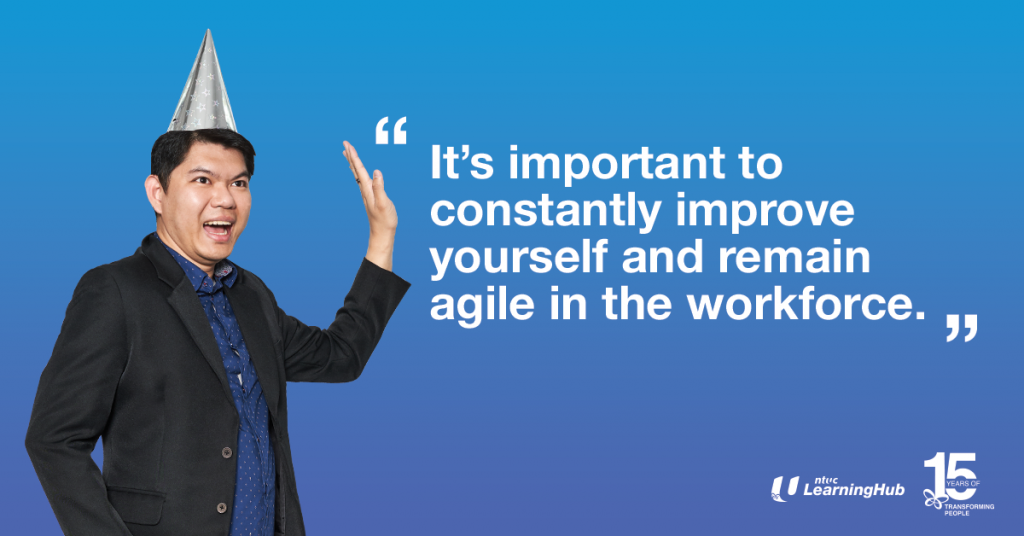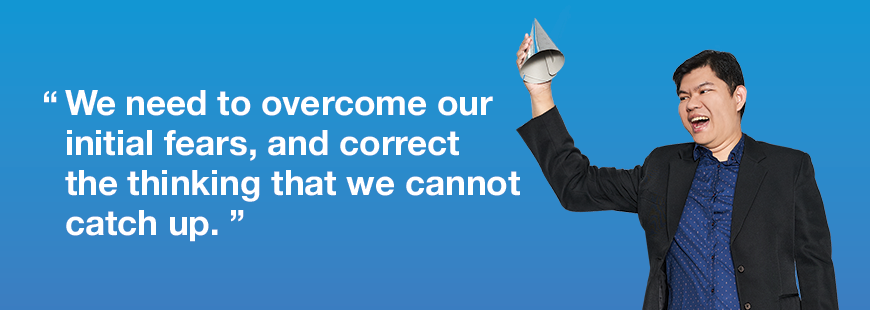Safe from Disruption In A Rapidly Changing World? Think again.
Safe from Disruption In A Rapidly Changing World? Think again.

Starting off as a junior staff member involved in account reconciliation, Weicai slowly climbed the corporate ladder thanks to the recognition and guidance of his boss and mentor, Mr Terence Hoon. Now, with 9 years of knowledge and experience under his belt, he’s focused on giving back and guiding his juniors through the rapidly evolving world of finance and accounting.
“Most of my colleagues view me as the go-to person for resolving billing, payroll and customer issues — basically anything and everything pertaining to finance,” said Weicai. “I function like a living, breathing, human FAQ!”
1. Upgrading yourself as a way of upgrading others
Upgrading your skills and knowledge is generally perceived as a means of progression in your own career. However, Weicai argues that the benefits extend beyond oneself. “It’s important to constantly upgrade yourself because your knowledge empowers not only you but those around you,” said Weicai.
The case for knowledge building and sharing is even stronger when you consider that we are working in an increasingly interconnected workplace. “Finance is never a one-man show. We cannot work alone. We must work as a team,” smiled Weicai. ”Camaraderie in the workplace is important — just ask anyone who has ever been through an audit!”
Weicai
However, he acknowledges that not everyone will be “ready” to learn the knowledge that we acquire and that sometimes we do need to take it slow. “Take my dad for example — he was afraid of technology and lacked basic computer skills, but now he can surf the net and even use Excel!” laughed Weicai. “We have to be patient and guide them, constantly letting them know that it’s doable.”
2. Acquiring complementary skills to build capability
Weicai predicts that menial accounting tasks, such as keying in invoices, will soon be phased out in favour of higher-level responsibilities such as reporting and data analysis. However, this also means that accountants will be held to higher standards and expected to acquire additional skills. “We use a lot of PivotTable and I attend forums to learn more about Big Data and Python etc. Data Visualisation is also extremely popular and simple to pick up,” advised Weicai. “Data is really going to be huge in the next few years. It’s important to constantly improve yourself and remain agile in the workforce.”
“I’m trained in both IT and accounting, so in a sense, I have the best of both worlds,” grinned Weicai. “I’m constantly encouraged to throw out ideas and improvise to solve problems. And I’m always thinking about how to automate this and resolve that accountancy problem using the IT tools that are available to me.”
For example, Weicai recalled a situation where his IT skills were able to save nearly two days of labour. “Recently, we reformulated a number of Microsoft Excel spreadsheets, turning what used to be a two-day chore into a two-hour affair,” said Weicai. “We were then able to pare it down further to thirty minutes and now it can be done in just five minutes!”
Complementary skills aren’t just those of a technical nature though; soft skills are just as important. “A large part of my job is presenting data,” said Weicai. “You just have to learn how to overcome stage fright and present facts in a clear, simple and direct manner because your audience has not been trained in finance like you have.”

3. Changing ourselves to keep up with change
When it comes to the future of the accounting and finance industry, Weicai sees a whole lot of disruption on the horizon. “The future is digital and the brick-and-mortar way of doing finance will change drastically in the next 10 to 15 years,” warned Weicai. “There will be little to no paperwork as the manual keying in of invoices will be handled by AI (Artificial Intelligence).”
While this prediction may seem bleak, Weicai reassures that AI won’t necessarily be taking our jobs — it will just change how we work. “AI is unable to account for unexpected factors, so instead of generating numbers, you will have to analyse and make sense of them,” said Weicai. “It’s up to us to look into the numbers and examine them — to discover certain hidden factors and explanations behind the data.”
Consequently, the future of our careers lies in our own hands and our ability to adapt to the new needs of the industry. “We need to overcome our initial fears and correct the thinking that we cannot catch up,” said Weicai. “Ultimately, it boils down to your willingness to learn. Do you take the initiative to improve yourself? Without picking up new skills and constantly improving yourself, how far can you progress in this day and age?”
This year, NTUC LearningHub celebrates 15 years of transforming people through accessible education. Since 2004, we have fulfilled over 2.3 million training places and transformed over 16,700 organisations.
Regardless of collar, age or nationality, we are here to help you change your skills to keep up with a rapidly changing workforce. For more information on how we can help, talk to our friendly Course Consultants at NTUC Trade Union House, Devan Nair Institute for Employment and Employability, LHUB @ Tampines Mall or any of our roadshows islandwide.
Reach out to our Skills Consultants to find out more about how you can transform your life through learning today!
You might like this
10 Reasons Why You Should Consider Being a Certified Information Systems Security Professional (CISSP)
10 Reasons Why You Should Consider Being a Certified Information Systems Security Professional (CISSP)
Upskilling for a new career post-retirement
Learning Never Stops: Reskilling for a Career Switch

